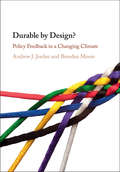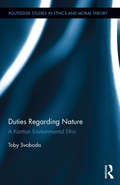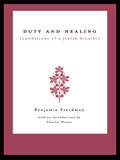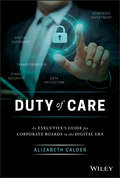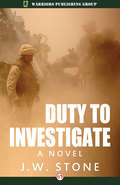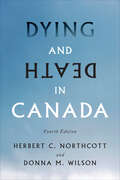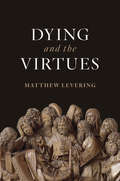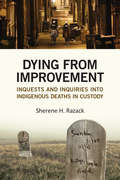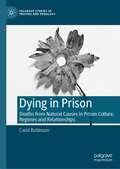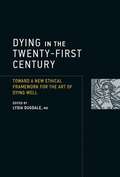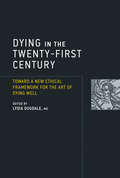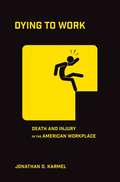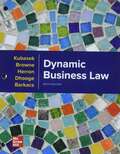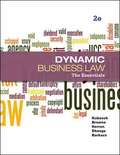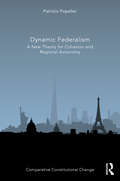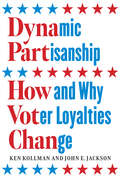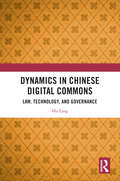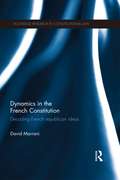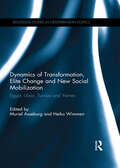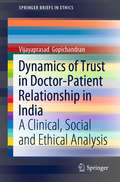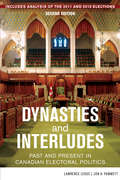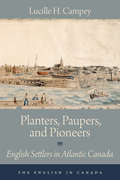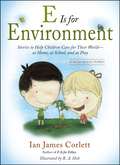- Table View
- List View
Durable by Design?: Policy Feedback in a Changing Climate
by Andrew J. Jordan Brendan MooreFollowing the landmark Paris agreement, policy makers are under pressure to adopt policies that rapidly deliver deep, society-wide decarbonisation. Deep decarbonisation requires more durable policies, but not enough is known about if and how they actually emerge. This book provides the first systematic analysis of the determinants of policy durability in three high-profile areas: biofuel production, car transport, and industrial emissions. It breaks new ground by exploring how key European Union climate policies have shaped their own durability and their ability to stimulate supportive political dynamics in society. It combines state-of-the-art policy theories with empirical accounts of landmark political events such as 'Dieselgate' and the campaign against 'dirty' biofuels, to offer a fresh understanding of how and why policy makers set about packaging together different elements of policy. By shining new light on an important area of contemporary policy making, it reveals a rich agenda for academic researchers and policy makers.
Duties Regarding Nature: A Kantian Environmental Ethic (Routledge Studies in Ethics and Moral Theory)
by Toby SvobodaIn this book, Toby Svoboda develops and defends a Kantian environmental virtue ethic, challenging the widely-held view that Kant's moral philosophy has little to offer environmental ethics. On the contrary, Svoboda contends that on Kantian grounds, there is good moral reason to care about non-human organisms in their own right and to value their flourishing independently of human interests, since doing so is constitutive of certain (environmental) virtues. Svoboda argues that Kant’s account of indirect duties regarding nature can ground a compelling environmental ethic: the Kantian duty to develop morally virtuous dispositions strictly proscribes unnecessarily harming organisms, and it also gives us moral reason to act in ways that benefit such organisms. Svoboda’s account engages the recent literature on environmental virtue (including Rosalind Hursthouse, Philip Cafaro, Ronald Sandler, Thomas Hill, and Louke van Wensveen) and provides an original argument for an environmental ethic firmly rooted in Kant’s moral philosophy.
Duty and Healing: Foundations of a Jewish Bioethic (Reflective Bioethics)
by Benjamin Freedman"Duty and Healing" positions ethical issues commonly encountered in clinical situations within Jewish law. The concept of duty is significant in exploring bioethical issues, and this book presents an authentic and non-parochial Jewish approach to bioethics, while it includes critiques of both current secular and Jewish literatures. Among the issues the book explores are the role of family in medical decision-making, the question of informed consent as a personal religious duty, and the responsibilities of caretakers. The exploration of contemporary ethical problems in healthcare through the lens of traditional sources in Jewish law is an indispensable guide of moral knowledge.
Duty and the Beast: Should We Eat Meat in the Name of Animal Rights?
by Andy LameyThe moral status of animals is a subject of controversy both within and beyond academic philosophy, especially regarding the question of whether and when it is ethical to eat meat. A commitment to animal rights and related notions of animal protection is often thought to entail a plant-based diet, but recent philosophical work challenges this view by arguing that, even if animals warrant a high degree of moral standing, we are permitted - or even obliged - to eat meat. Andy Lamey provides critical analysis of past and present dialogues surrounding animal rights, discussing topics including plant agriculture, animal cognition, and in vitro meat. He documents the trend toward a new kind of omnivorism that justifies meat-eating within a framework of animal protection, and evaluates for the first time which forms of this new omnivorism can be ethically justified, providing crucial guidance for philosophers as well as researchers in culture and agriculture.
Duty of Care: An Executive's Guide for Corporate Boards in the Digital Era
by Alizabeth CalderAn essential guide for board members and executives who need to understand the impact of digital on their thinking and decision making Duty of Care: An Executive's Guide for Corporate Boards in the Digital Era offers a much needed guide for board directors and leaders who need to get up-to-speed and close their digital knowledge gap in order to make the right decisions about digital technology investment and deployments. Written in easy-to-read language, this book targets directors and executives who want to protect themselves from risks ranging from massive cyber security breaches to digital infrastructure investment mistakes. Most board members don’t have the information they need to understand digital information systems, modern high-speed networks, and rapidly evolving software and hardware ecosystems. They also don’t have the time to seek out or filter what they need from the many diverse sources. Their lack of knowledge can lead to disastrous decisions that can cost shareholders billions of dollars in lost income or risk liability. Written by a globally recognized experienced business executive and expert in cyber security, this essential guide and blueprint can serve the strategic and governance needs of every company. Written by an noted expert in cyber security and digital strategy Designed to be accessible for board members unfamiliar with digital technology, with case studies and smart questions to support leaders on every topic Helps board directors, corporate officers, and corporate investors with the digital knowledge needed to make informed decisions Duty of Care is a comprehensive yet accessible book that helps board members close their “digital knowledge gap” in order to better serve their corporations.
Duty to Investigate: A Novel
by J. W. StoneAs a successful trial lawyer, Mike Beck uses his personality and his skill with the letter of the law to win in a courtroom. As a marine reservist ordered to Iraq on an unexpected deployment, he finds himself in a different world where the law of war often conflicts with common sense and his own feel for what's right and what's wrong.When an embedded female correspondent reveals what appears to be an illegal killing of Iraqi civilians by a US marine during the battle for Fallujah, Beck finds himself faced with a case that challenges both his legal skills and his conviction that something is very wrong with what seems to be a clear violation of the law of land warfare. Devoted to finding the truth about an ugly incident and keeping an innocent marine from being convicted in a court-martial, Mike Beck defies orders, purloins evidence, and leads a combat team that must fight its way through a fanatical enemy force to investigate the scene of the alleged crime.Along the way as he battles his conscience, command influence, and a media giant clamoring for his head, Mike Beck finds a lot of truth about the case, about the brutal enemy in Iraq, about the nature of a very nasty war, about the marines risking their lives in a confusing combat situation--and about himself as a marine, a lawyer, and a man.
Dying and Death in Canada, Fourth Edition
by Donna Wilson Herbert NorthcottDying and Death in Canada provides a comprehensive, up-to-date examination of dying, death, and bereavement from a Canadian perspective. The fourth edition covers current issues and recent developments in the field, such as the implementation of Medical Assistance in Dying (MAID) and the implications of the COVID-19 pandemic. New topics include death doulas, death tourism, psychogenic death, bonds between the living and the dead, mass death events, and cultural diversity, sensitivity, and competence. This edition combines current research and language used to destigmatize conversations surrounding suicide, while new case studies offer personal accounts from doctors, nurses, and family members of the deceased. Exploring the significance of end-of-life experiences, Dying and Death in Canada shows that how we live influences how we die, and the society and culture in which we live has a profound effect on how we behave when confronted with dying and death.
Dying and the Virtues
by Matthew LeveringIn this rich book Matthew Levering explores nine key virtues that we need to die (and live) well: love, hope, faith, penitence, gratitude, solidarity, humility, surrender, and courage.Retrieving and engaging a variety of biblical, theological, historical, and medical resources, Levering journeys through the various stages and challenges of the dying process, beginning with the fear of annihilation and continuing through repentance and gratitude, suffering and hope, before arriving finally at the courage needed to say goodbye to one&’s familiar world. Grounded in careful readings of Scripture, the theological tradition, and contemporary culture, Dying and the Virtues comprehensively and beautifully shows how these nine virtues effectively unite us with God, the One who alone can conquer death.
Dying from Improvement
by Sherene RazackNo matter where in Canada they occur, inquiries and inquests into untimely Indigenous deaths in state custody often tell the same story. Repeating details of fatty livers, mental illness, alcoholic belligerence, and a mysterious incapacity to cope with modern life, the legal proceedings declare that there are no villains here, only inevitable casualties of Indigenous life.But what about a sixty-seven-year-old man who dies in a hospital in police custody with a large, visible, purple boot print on his chest? Or a barely conscious, alcoholic older man, dropped off by police in a dark alley on a cold Vancouver night? Or Saskatoon's infamous and lethal starlight tours, whose victims were left on the outskirts of town in sub-zero temperatures? How do we account for the repeated failure to care evident in so many cases of Indigenous deaths in custody?In Dying from Improvement, Sherene H. Razack argues that, amidst systematic state violence against Indigenous people, inquiries and inquests serve to obscure the violence of ongoing settler colonialism under the guise of benevolent concern. They tell settler society that it is caring, compassionate, and engaged in improving the lives of Indigenous people - even as the incarceration rate of Indigenous men and women increases and the number of those who die in custody rises.Razack's powerful critique of the Canadian settler state and its legal system speaks to many of today's most pressing issues of social justice: the treatment of Indigenous people, the unparalleled authority of the police and the justice system, and their systematic inhumanity towards those whose lives they perceive as insignificant.
Dying in Prison: Deaths from Natural Causes in Prison Culture, Regimes and Relationships (Palgrave Studies in Prisons and Penology)
by Carol RobinsonThis book uses empirical data gathered using ethnographic methods in two contrasting prisons to provide a rare insight into death and dying in prisons in the UK. The majority of deaths in prison custody in England and Wales result from natural causes, yet the experiences of people dying in prison and the impact of these deaths on the wider prison are under-researched areas. It provides a novel insight into the impact of deaths from natural causes on the prison as an institution and challenges existing work juxtaposing occupational philosophies of ‘care’ and ‘control’. It also identifies how end of life care is provided in prisons and the impact this has on culture and relationships shows how deaths from natural causes in prison custody ‘soften’ prison regimes, culture and relationships. It speaks to an international audience by drawing on the global literature including from the US.
Dying in the Twenty-First Century
by Lydia DugdaleMost of us are generally ill-equipped for dying. Today, we neither see death nor prepare for it. But this has not always been the case. In the early fifteenth century, the Roman Catholic Church published the Ars moriendi texts, which established prayers and practices for an art of dying. In the twenty-first century, physicians rely on procedures and protocols for the efficient management of hospitalized patients. How can we recapture an art of dying that can facilitate our dying well? In this book, physicians, philosophers, and theologians attempt to articulate a bioethical framework for dying well in a secularized, diverse society. Contributors discuss such topics as the acceptance of human finitude; the role of hospice and palliative medicine; spiritual preparation for death; and the relationship between community, and individual autonomy. They also consider special cases, including children, elderly patients with dementia, and death in the early years of the AIDS epidemic, when doctors could do little more than accompany their patients in humble solidarity.These chapters make the case for a robust bioethics -- one that could foster both the contemplation of finitude and the cultivation of community that would be necessary for a contemporary art of dying well. ContributorsJeffrey P. Bishop, Lisa Sowle Cahill, Daniel Callahan, Farr A. Curlin, Lydia S. Dugdale, Michelle Harrington, John Lantos, Stephen R. Latham, M. Therese Lysaught, Autumn Alcott Ridenour, Peter A. Selwyn, Daniel Sulmasy
Dying in the Twenty-First Century: Toward a New Ethical Framework for the Art of Dying Well (Basic Bioethics)
by Lydia DugdalePhysicians, philosophers, and theologians consider how to address death and dying for a diverse population in a secularized century.Most of us are generally ill-equipped for dying. Today, we neither see death nor prepare for it. But this has not always been the case. In the early fifteenth century, the Roman Catholic Church published the Ars moriendi texts, which established prayers and practices for an art of dying. In the twenty-first century, physicians rely on procedures and protocols for the efficient management of hospitalized patients. How can we recapture an art of dying that can facilitate our dying well? In this book, physicians, philosophers, and theologians attempt to articulate a bioethical framework for dying well in a secularized, diverse society.Contributors discuss such topics as the acceptance of human finitude; the role of hospice and palliative medicine; spiritual preparation for death; and the relationship between community, and individual autonomy. They also consider special cases, including children, elderly patients with dementia, and death in the early years of the AIDS epidemic, when doctors could do little more than accompany their patients in humble solidarity.These chapters make the case for a robust bioethics—one that could foster both the contemplation of finitude and the cultivation of community that would be necessary for a contemporary art of dying well.ContributorsJeffrey P. Bishop, Lisa Sowle Cahill, Daniel Callahan, Farr A. Curlin, Lydia S. Dugdale, Michelle Harrington, John Lantos, Stephen R. Latham, M. Therese Lysaught, Autumn Alcott Ridenour, Peter A. Selwyn, Daniel Sulmasy
Dying to Work: Death and Injury in the American Workplace
by Jonathan D. KarmelIn Dying to Work, Jonathan Karmel raises our awareness of unsafe working conditions with accounts of workers who were needlessly injured or killed on the job. Based on heart-wrenching interviews Karmel conducted with injured workers and surviving family members across the country, the stories in this book are introduced in a way that helps place them in a historical and political context and represent a wide survey of the American workplace, including, among others, warehouse workers, grocery store clerks, hotel housekeepers, and river dredgers.Karmel’s examples are portraits of the lives and dreams cut short and reports of the workplace incidents that tragically changed the lives of everyone around them. Dying to Work includes incidents from industries and jobs that we do not commonly associate with injuries and fatalities and highlights the risks faced by workers who are hidden in plain view all around us. While exposing the failure of safety laws that leave millions of workers without compensation and employers without any meaningful incentive to protect their workers, Karmel offers the reader some hope in the form of policy suggestions that may make American workers safer and employers more accountable. This is a book for anyone interested in issues of worker health and safety, and it will also serve as the cornerstone for courses in public policy, community health, labor studies, business ethics, regulation and safety, and occupational and environmental health policy.
Dynamic Business Law
by Nancy Kubasek Linda Barkacs M. Neil Browne Lucien Dhooge Daniel HerronDesigned for business majors taking a two semester Business Law course, Dynamic Business Law incorporates an ethical decision-making framework, an emphasis on critical thinking, and a focus on business relevance. Updated cases, new coverage on entrepreneurship and it's interface with the law, and a refreshed "Practical Tips for Business Managers" feature provides a decision-making framework to help students think critically about these evolving topic areas and apply what they are learning to business.
Dynamic Business Law: The Essentials
by Nancy Kubasek Linda Barkacs Lucien Dhooge M. Browne Daniel HerronDynamic Business Law: The Essentials is appropriate for the one-semester Business Law course. It contains the basics of business law but does not get bogged down in the kind of details that are more appropriate in an upper-level law class. The text provides an examination of the basic questions, concepts, and legal rules of business law. Emphasis on the BUSINESS in business law. Dynamic Business Law: The Essentials emphasizes the tie of legal issues back to the core business curriculum. This will help both students and faculty. Faculty need to know how this is integrated as they are constantly 'defending' the inclusion of this course in the business curriculum. And students need to understand how the concepts tie to their future business careers. Emphasis on TEACHING. Many professors teaching this course are attorneys first and academics second. They do not have a lot of time to prepare or think about how to apply this information effectively for their business students. Dynamic Business Law: The Essentials contains a helpful instructor's manual, particularly for the many adjuncts teaching this course. Emphasis on CRITICAL THINKING. Neil Browne, one of the co-authors of this text, has written a successful text on critical thinking. His framework is included in Dynamic Business Law: The Essentials as well - to help students learn how to frame and reframe a question/issue. Critical thinking questions are also included at the end of each case, to tie in this component even further.
Dynamic Fair Dealing
by Martin Zeilinger Rosemary Coombe Darren WershlerDynamic Fair Dealing argues that only a dynamic, flexible, and equitable approach to cultural ownership can accommodate the astonishing range of ways that we create, circulate, manage, attribute, and make use of digital cultural objects.The Canadian legal tradition strives to balance the rights of copyright holders with public needs to engage with copyright protected material, but there is now a substantial gap between what people actually do with cultural forms and how the law understands those practices. Digital technologies continue to shape new forms of cultural production, circulation, and distribution that challenge both the practicality and the desirability of Canada's fair dealing provisions.Dynamic Fair Dealing presents a range of insightful and provocative essays that rethink our relationship to Canadian fair dealing policy. With contributions from scholars, activists, and artists from across disciplines, professions, and creative practices, this book explores the extent to which copyright has expanded into every facet of society and reveals how our capacities to actually deal fairly with cultural goods has suffered in the process. In order to drive conversations about the cultural worlds Canadians imagine, and the policy reforms we need to realize these visions, we need Dynamic Fair Dealing.
Dynamic Federalism: A New Theory for Cohesion and Regional Autonomy (Comparative Constitutional Change)
by Patricia PopelierThis book offers a new theory of federalism. The work critically discusses traditional federal theories and builds on theories that focus on the dynamics of federalism. It offers a definition of federalism and federal organizations that encompasses both new and old types of multi-tiered system. Unlike traditional federal theory, it is well-suited to research both multinational and mononational systems. It also takes into account the complexity of these systems, with bodies of governance at the local, regional, national, and supranational level. The book is divided into three parts: the first part outlines the contours of dynamic federalism, based on a critical overview of traditional federal theory; the second part develops comprehensive indexes to measure autonomy and cohesion of multi-tiered systems; and the third part focuses on the dynamics of federal organizations, with a special focus on institutional hubs for change. Dynamic Federalism will be an essential resource for legal, social, economic, and political scholars interested in federalism, regionalism, and de/centralization.
Dynamic Partisanship: How and Why Voter Loyalties Change
by Ken Kollman John E. JacksonWhy do people identify with political parties? How stable are those identifications? Stable party systems, with a limited number of parties and mostly stable voter identification with a party, are normally considered significant signals of a steady democracy. In Dynamic Partisanship, Ken Kollman and John E. Jackson study changing patterns of partisanship in the United States, the United Kingdom, Canada, and Australia over the last fifty years in order to disentangle possible reasons for shifting partisanship and party identification. The authors argue that changes in partisanship can be explained by adjustments in voters’ attitudes toward issues or parties; the success or failure of policies advocated by parties; or alterations in parties’ positions on key issues. They contend that, while all three factors contribute, it is the latter, a party changing positions on a chief concern, that most consistently leads voters to or from a particular party. Their approach provides a deeper knowledge of the critical moving parts in democratic politics.
Dynamics in Chinese Digital Commons: Law, Technology, and Governance
by Hu LingThe book provides an up-to-date, comprehensive, and critical explanation of digital commons in China.It aims to reshape the theoretical discussion of digital commons, stressing the significance of digital mode of production and power division structure between government and digital platforms—both characters shed light on how China has developed its digital economy and maintained a relatively innovative cyberspace during the past 20 years. This book could serve as a foundational analysis for future studies on China’s Internet.The book will appeal to scholars, entrepreneurs, and policymakers interested in digital commons, governance of cyberspace, and China's political economy.
Dynamics in the French Constitution: Decoding French Republican Ideas (Routledge Research in Constitutional Law #4)
by David MarraniThe promulgation of the Fifth French Republic Constitution in 1958 marked the end of a complex constitutional history that has since 1789 seen more than twenty constitutions and five Republics. Lasting now for more than fifty years, the Fifth Republic Constitution has proven to be the right settlement for the French people; a consensual text. However, while offering the appearance of stability, the Fifth French Republic Constitution has often been reconsidered and changed, not least in the year of its fiftieth anniversary, when the Constitution was 'modernised'. These dynamics of the Fifth Republic Constitution are neither a recent matter nor entirely the result of the successive constitutional amendments. Instead, the history of the Constitution has involved the resurgence of repressed archaic elements from the ancient regime, while the social, economic and environmental contexts have penetrated not only the text itself but more extensively its spirit, and behind it, the philosophy and our perception of the Republic. In Dynamics in the French Constitution, David Marrani questions the foundations of the French Fifth Republic. In using specific themes, current and traditional debates, contemporary and archaic factors, that have enlightened the road of long lasting Republic, the book explores some of the changes of the last fifty years and the tensions that are present within the constitutional text. In combining theoretical concepts of constitutional law with key contemporary and historical developments, such as the European integration, the response to environmental challenges, the practice of human rights and the pillars supporting French republicanism, this book offers varied and creative tools for a better understanding of the Republic of today.
Dynamics of Transformation, Elite Change and New Social Mobilization: Egypt, Libya, Tunisia and Yemen (Routledge Studies in Mediterranean Politics)
by Muriel Asseburg and Heiko WimmenThe political transformations initiated by the so-called Arab Spring in Egypt, Libya, Tunisia and Yemen have been marked by strong political contention, continued social mobilization and, albeit to different degrees, weak central state institutions. This book proposes that, rather than agreed roadmaps of institutional change (e.g. elections, drawing up new constitutions) and centrally crafted transition processes, it has been the competition of key political actors for resources of political power and control that has set the pace and influenced the direction and depth of the transformation processes. Hence, the contributions in this volume use an actor-centred approach. Two perspectives are assumed: first key political actors – referring to the "Politically Relevant Elite (PRE)"– are identified and their motivations as well as their strategies and capacities to steer the transformation process. Secondly , the authors investigate the capacity of politically "Mobilized Publics" to exert influence on agenda setting and decision making, ask to what extent popular and social movements have emerged as political actors in their own right, and to what extent such forms of bottom-up participation have constituted a fundamental change to the political culture of these countries. Both avenues of inquiry analyze how the elites are constrained by continued social mobilization, how they engage with mobilized publics to promote their own agendas, and whether the extended scope of popular participation contributes to the legitimacy and stability of the emerging political orders, or causes disruption, fragmentation and conflict. This book was previously published as a special issue of Mediterranean Politics.
Dynamics of Trust in Doctor-Patient Relationship in India: A Clinical, Social and Ethical Analysis (SpringerBriefs in Ethics)
by Vijayaprasad GopichandranThis book offers an easy-to-read, yet comprehensive introduction to practical issues in doctor–patient relationships in a typical low- and middle-income country setting in India, examining in detail the reasons for erosion of trust and providing guidance on potential research areas in the field. It strikes a balance between empirical work and theoretical normative analysis, while adopting mixed-method research in exploring important constructs in the doctor–patient relationship, such as trust, solidarity, advocacy, patient-centeredness, privacy, and confidentiality. Since the concept of trust has direct implications for the ethical practice of medicine, the book is a valuable resource for academics and researchers in the field of medical, clinical, and applied ethics.
Dynasties and Interludes: Past and Present in Canadian Electoral Politics
by Lawrence Leduc Jon H. Pammett André TurcotteThe Hill Times: Best Books of 2016 An overview of the history of elections and voting in Canada, including minority governments, dynasties, and social movements. Dynasties and Interludes provides a comprehensive and unique overview of elections and voting in Canada from Confederation to the most recent election. Its principal argument is that the Canadian political landscape has consisted of long periods of hegemony of a single party and/or leader (dynasties), punctuated by short, sharp disruptions brought about by the sudden rise of new parties, leaders, or social movements (interludes). This revised and updated second edition includes an analysis of the results of the 2011 and 2015 federal elections as well as an in-depth discussion of the “Harper Dynasty.”
Dynasties and Interludes: Past and Present in Canadian Electoral Politics
by Lawrence Leduc Jon H. Pammett Judith I. Mckenzie André TurcotteDynasties and Interludes provides a comprehensive and unique overview of elections and voting in Canada from Confederation to the recent spate of minority governments. Its principal argument is that the Canadian political landscape has consisted of long periods of hegemony of a single party and/or leader (dynasties), punctuated by short, sharp disruptions brought about by the sudden rise of new parties, leaders, or social movements (interludes). Changes in the composition of the electorate and in the technology and professionalization of election campaigns are also examined in this book, both to provide a better understanding of key turning points in Canadian history and a deeper interpretation of present-day electoral politics.
E Is for Environment
by Ian James CorlettFrom the author of E IS FOR ETHICS, 26 stories with eco-friendly messages, accompanied by illustrations, discussion questions, and conservation tips.
